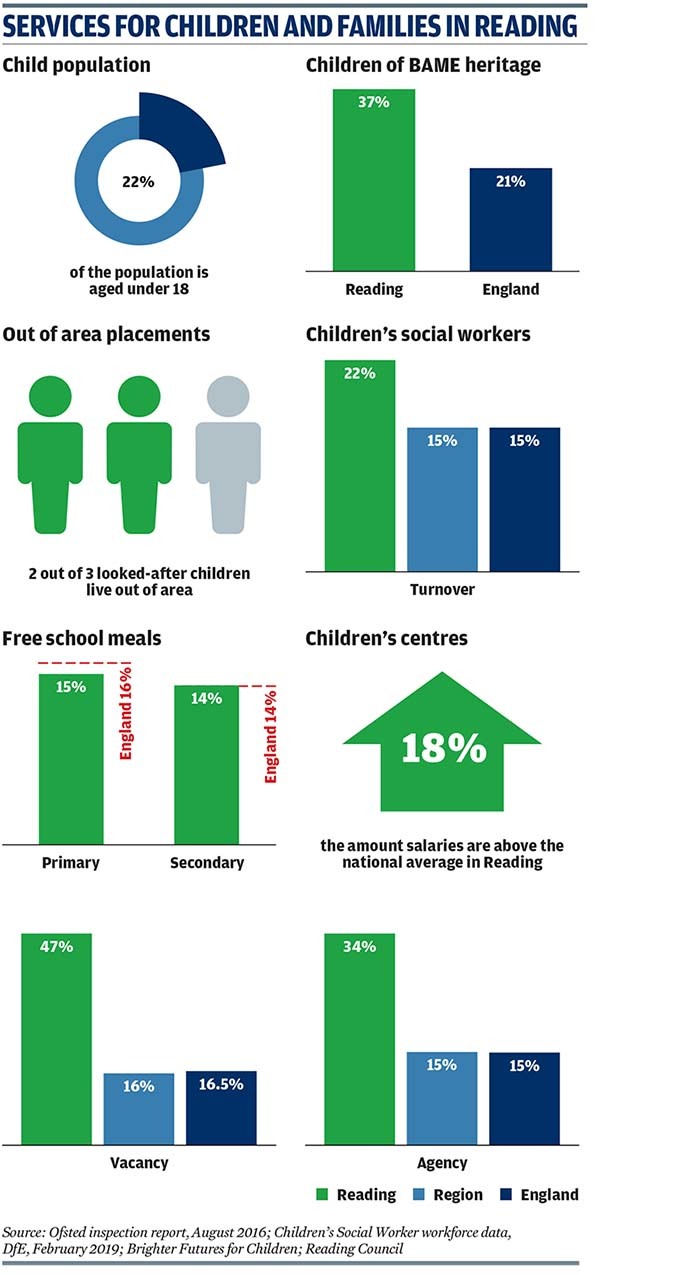Reading children's services: Local Spotlight
Derren Hayes
Monday, May 27, 2019
Creation of not-for-profit company to run children's services aims to rebuild profession's reputation in Berkshire town.

Last December, the Berkshire town of Reading became the latest authority to transfer the running of its children's services from the council to an independent organisation.
The move, backed by a £2.9m government grant, was in response to slow progress by the council in tackling child protection failings that led to children's services being rated "inadequate" in August 2016.
The town has a growing population of more than 300,000, of which 22 per cent are aged under 18. The proportion of children eligible for free school meals is just below national averages at primary and secondary levels. However, nearly one in five children live in poverty.
Reading is a multi-cultural area, with 37 per cent of all children being of minority ethnic heritage, compared with 21 per cent nationally. This reflects high rates of children who speak English as an additional language in Reading schools.
The proportion of children in care in Reading is stable but above the average for England. The 2016 Ofsted report also highlights how more than two-thirds of looked-after children live in placements outside the local authority area. The number of children that are looked-after, on child protection plans and assessed as a child in need rose significantly between 2015 and 2016.

The wider outlook for children and young people in Reading looks rosier. The town has high levels of employment thanks to its location on the M4 corridor and commutable distance to London, Oxford and Bristol. Half the working population is educated to graduate level and the average salary is 18 per cent above the national average.
Reading is in the top 10 per cent least deprived areas in England under the IDACI measure, but this hides pockets of deep child poverty, with more than half of children in some areas of the town eligible for the pupil premium.
Antony Kildare, managing director of not-for-profit company Brighter Futures for Children, which took over children's services in Reading, says this can be seen in the rising use of food banks.
The buoyant economy has made it harder for Reading Borough Council to recruit social workers, a factor identified by Kildare as one of the key challenges for Brighter Futures.
Latest Department for Education data shows social worker turnover was 22 per cent at 30 September 2018 compared with a national and regional average of 15 per cent. In addition, a third of staff were agency workers - double the rate for England - and 46 per cent of social work posts were vacant, three-times the average in the South East.
However, Brighter Futures says these rates have fallen significantly recently: 49 per cent of social worker posts are interim and 21 per cent are vacant.
STABILISING WORKFORCE KEY TO IMPROVING PRACTICE, SAYS CHIEF OF NEW COMPANY
It is six months since Brighter Futures for Children began operating. Over that time, 525 staff have transferred from Reading Borough Council to the new not-for-profit limited company. Although owned by the council, the company - which has a budget of £135m in 2019/20 - is run independently. However, unlike the handful of independent trusts that have gone before - which have tended to focus on delivering just children's social care - Brighter Futures has taken on responsibility for all children's services including early help, special educational needs and disabilities, education and social care.
Antony Kildare, Brighter Futures' managing director, says the "culture shift" from moving out of a council mindset to that of a company is ongoing.
"We're doing our best to work with staff and are engaging with them at every step of the way," he says. "All of the staff directly responsible for delivering children's services have now transferred to the new company."
Kildare stresses that the relationship between the company and council "is a good one". "It continues to strengthen as the lines of responsibility become clearer," he adds.
"Local authorities have many different priorities, but we're able to focus exclusively on children's services."
Kildare is a teacher by profession with a record of running organisations in the public and private sectors. It is his extensive experience of "working in the space between the public and private sectors" that makes him a good fit.
Top of Kildare's challenges is improving the quality of social work practice. It is investing £1.8m in social work training and development over three years, which it hopes will address issues identified in a recent Ofsted monitoring report which raised concerns about inconsistent child protection practice and the accuracy of data systems to record casework.
The company's business plan, which has been approved by the council, has 28 projects as part of a "transformation programme", 10 of which are focused on improving children's social care.
Ofsted also raised concerns about high turnover of staff, and the company has developed a package of benefits offered to staff including discounted travel, parking and on-site day nursery. Kildare adds: "Our selling points are that we are smaller [than many social work employers] and have a flatter management structure so managers are closer to the ground. It means they are closer to the teams supporting the child and more accessible to support staff."
Another aspect of the transformation plan is reducing reliance on paper-based systems in favour of improved IT and computerised recording.
Unlike many "inadequate" departments, looked-after children numbers in Reading are stable, although Kildare is keen to reduce the number through adopting a more restorative social work model of practice. The company is investing £3m over three years into improving early help and foster placement services with the aim of reducing the number of children in care by 20 per cent.
Reducing use of out-of-area placements is another target - Brighter Futures has established its own non-profit fostering agency and is looking to boost foster carer numbers so more children can be cared for locally.




